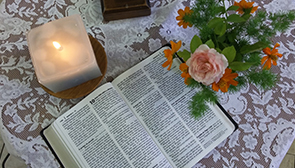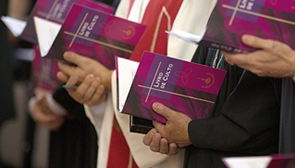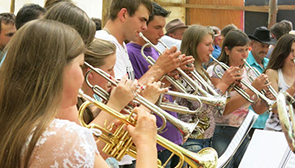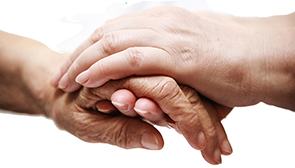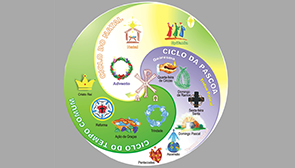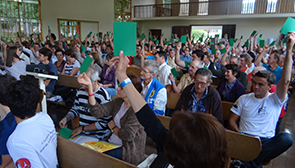BIBLE STUDY 2
Pastora Ofelia Dávila Llimpe
Iglesia Luterana del Perú
Traducción: Elisa Pérez Trejo
Iglesia Luterana Mexicana.
Read Matthew 20:1-16
The parable of the workers in the vineyard offers us an illustration of a different image about the kingdom of heaven where some of the vineyard workers disagree with the payment they received and it is to them that the main character the owner of the Vineyard responds by arguing that he has made a fair payment, because that was the initial treatment between them. When he says, Friend, I'm not doing you any injustice, that's what we agreed to.
In the Old Testament, the vineyard is a symbol for Israel, the people of God (see Isaiah 5: 1-7; Jeremiah 12:10). The analogy in the parable then suggests that God needs people to work in his vineyard. And the agreed payment a denarius was normal for a day of work. The workers do not complain because the pay is fair. They complain about the service time.
What is the injustice in this text?
If we approach the text from the point of view of the one who claims for a fair treatment in relation to the payment, of course we will say; that an injustice is being committed. Because it's not fair that someone who works all day receives the same payment as someone who works less hours. We will say this is unfair.
We could argue with examples of our life and from women in our communities. Where many women work outside their houses and when they return home they continue working, or now in times of pandemic and quarantine many of the women continue to work from home for other people and doing things for their own families. Because as women, many of us have been educated and formed by the patriarchal society and in that role they taught us that we must be thoughtful to any need that arises at our home, to see how to solve it either as: wife, mother, sister, aunt, or grandmother. This continues to be a constant image even today in the 21st century for many women in our countries, for sample we can see how things are going at home. From the Women's Network there are also voices that rise and we say this is unfair. But if we go a little further in our reflection we will ask ourselves what is the kingdom of heaven and how do we understand the kingdom of God. Where each one arrives at different times in life and the owner of the vineyard offers us the same payment.
What does the parable teach us about God?
The Parable teaches us that the kingdom of heaven has been taking place for a long time and continues to take place now, where God shows his goodness in payment. But it reminds us that the kingdom of heaven needs to be shared as the good news to each person and that these signs of the kingdom are given through a dignified, fair and healthy treatment among us, seeking full and abundant life, as we remember John 10:10. For this it is important to go to the call to meet and walk with other people.
If we see the payment of the owner of the vineyard to his workers we will see the infinite goodness of God. When we understand the teachings of Jesus about what is the kingdom of heaven, we understand that God calls us to live in Christian freedom, having equality in my rights and respecting the rights of others, receiving and providing dignified treatment as human beings and that lead me in life with respect and tolerance towards other people. Through the parable, we realize that there is a real call and we are free to accept the call or not.
What is our calling and what does history teach us?
The call of God to each woman and man is given at all times and understanding that it is the grace of God that is offered to me is important, so when we embrace faith in Jesus Christ liberator, it helps us understand this call that is a constant walk following the teachings of Jesus, trying to feel and understand as a family that the current situation of women and girls continue to be violated in their rights and there is much to be done in ourselves and in our communities, we must change our “chip” and of course and also change the chip throughout society, what a task we have right? There is much to be done in relation to the rights of women to the rights of boys and girls, and the labor rights of women and as long as there are situations of injustice in human relations, the call to work in the vineyard will continue to be a constant, especially as long as there are unequal relationships in the vineyard in terms of economic, social, racial and gender, affecting human beings and their integrity, God will continue to call us.
God continues to call us to work in the vineyard, because it is important to announce and share the message of the Kingdom of God in the midst of our society, whether we start the reflections at home, in the church, or wherever we are. Let's make a commitment to an action we want to achieve, feeling that there are women who are here to accompany you. And we commit to walking together announcing that it is important that we live in a dignified and healthy environment. Looking from all the organisms of the society and try to re-build a society with Justice and equal treatment between men and women, between boys, girls and old men, old women.
That the Divine Wisdom that inspired women who embraced the call to change unjust situations within the home and in society and achieved significant changes in favor of women. Be also the inspiration for us, and for us to join this journey for equality in the rights of women in all areas of society, today and tomorrow. Trusting that divine wisdom will move us and motivate us to reflect and respond to God's call to work in his vineyard.




